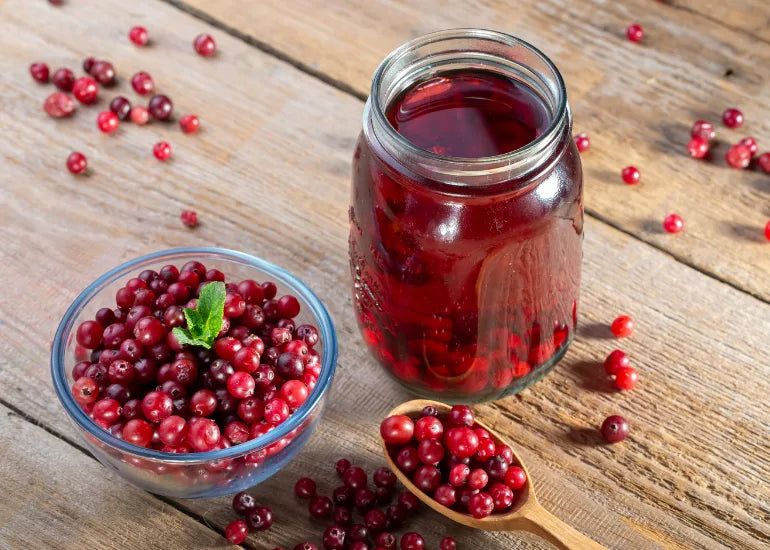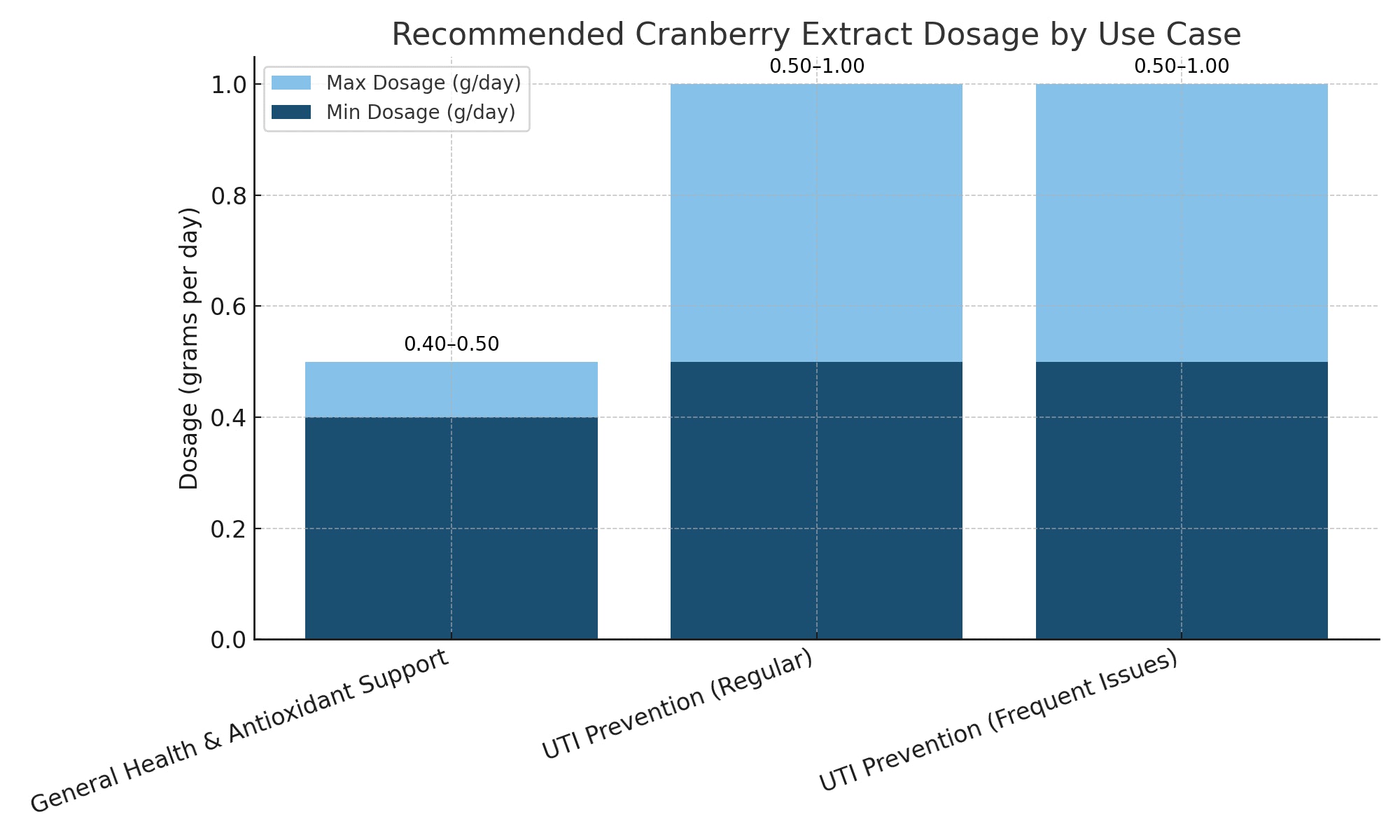To shop in USA, Canada and UK, go to
miduty.shop


Cranberries (Vaccinium macrocarpon) are small, deep red berries native to North America. Traditionally used by Indigenous peoples for food, dye, and medicine, cranberries have gained global recognition for their therapeutic potential particularly in promoting urinary tract health. While whole cranberries and juice have been part of folk medicine for centuries, modern science has distilled their benefits into cranberry extract: a concentrated form designed to deliver high levels of bioactive compounds in a small dose.
Cranberry extract is derived from the fruit's skin and flesh through a process that typically includes drying, crushing, and solvent extraction. This method allows manufacturers to concentrate beneficial compounds like proanthocyanidins (PACs), flavonoids, and organic acids without retaining the sugar content often present in cranberry juice.
The most effective extracts are standardized, meaning they contain a specific percentage of PACs.
Cranberry extract has polyphenols, particularly A-type proanthocyanidins (PACs). These compounds are unique because they prevent certain bacteria (like E. coli) from adhering to the urinary tract lining, offer antioxidant protection, neutralizing free radicals that cause cellular damage and provide anti-inflammatory effects.
Other important compounds in cranberry extract include flavonols, organic acids (such as quinic and benzoic acid), and anthocyanins all of which contribute to its health-enhancing properties.
When it comes to cranberry supplements, Miduty's Cranberry Extract leads with science, integrity, and unmatched quality. Featured in Miduty's premium formulations, it's tailored for those seeking clinically proven, clean-label solutions.
Miduty delivers a potent, standardized extract with up to 36 mg of Proanthocyanidins (PACs) per serving the optimal level recommended by clinical studies for UTI prevention and urinary tract health. Unlike other brands that provide minimal or undisclosed PAC content, Miduty guarantees you're getting a therapeutic dose that works.
This standardization ensures consistent and effective results with every capsule.
| Uses & Benefits | Description |
| Preventing and Managing Urinary Tract Infections (UTIs) |
UTIs are often caused by Escherichia coli (E. coli) bacteria attaching to the walls of the bladder and urinary tract. Cranberry extract, thanks to its PAC content, creates a slippery surface that prevents these bacteria from clinging to the urinary lining. [1] While cranberry juice can offer similar effects, most commercially available juices are loaded with sugar and contain only a fraction of the PACs found in standardized extracts. That's why cranberry supplements have become a go-to for those with recurrent UTIs or anyone wanting a proactive defense. Unlike antibiotics, which kill bacteria outright (and sometimes disrupt gut flora), cranberry’s PACs target the bacteria’s ability to stick around and cause infection. [2] Several studies have shown that daily use of cranberry extract can reduce UTI recurrence, particularly in women, seniors, and individuals with catheters or certain chronic health conditions. [3] |
| Antioxidant Defense and Detoxification |
Like other berries, cranberries are antioxidant-rich. But cranberry extract delivers these benefits in a more potent form. Antioxidants in the extract combat oxidative stress linked to aging and chronic disease, support liver detoxification processes and help neutralize environmental toxins and heavy metals. [4] This makes cranberry extract a natural ally for those living in polluted environments or dealing with daily oxidative stress. [5] [6] |
| Promotes Gut and Immune Health |
Research suggests cranberry extract may positively influence gut health by fostering a favorable balance of microbes. A healthy gut is foundational to a strong immune system, improved mood, and reduced inflammation throughout the body. [7] [8] Furthermore, the antimicrobial properties of PACs can inhibit the growth of harmful microbes without disrupting beneficial bacteria, giving your immune system a cleaner slate to work with. |
| Supports Cardiovascular and Metabolic Function | Some emerging research has linked cranberry extract to improved cardiovascular markers. It may help reduce LDL cholesterol and increase HDL levels, improve blood sugar regulation in people with insulin resistance, enhance endothelial function, which contributes to healthier arteries. [9] [10] |
| Rich in Polyphenols and Antioxidants |
Cranberry extract is loaded with polyphenols, including quercetin, myricetin, and the aforementioned PACs. These compounds reduce oxidative stress and protect cellular structures, support heart health by improving blood vessel function, and decrease inflammation markers in the body. [11] For individuals looking to enhance overall wellness and longevity, cranberry extract is a natural, low-risk supplement option with broad-reaching benefits. |
| Oral Health and Gum Support |
Cranberry's antibacterial action doesn't stop at the bladder. PACs in the extract have been shown to prevent the formation of dental plaque and reduce the growth of harmful bacteria like Streptococcus mutans—a key player in tooth decay and gum disease. [12] Adding cranberry extract/supplement to your wellness routine could support healthier gums, reduce bad breath, and enhance your overall oral hygiene. |

Recommended Daily Intake for General Health: For general health maintenance and antioxidant support, a typical daily dose of cranberry extract is between 400-500 mg, standardized to at least 36 mg of PACs. This ensures you're getting enough active compounds to support urinary and immune health effectively.
Dosage for UTI Prevention: For individuals specifically targeting UTIs, research supports a daily intake of 500-1,000 mg of cranberry extract, ideally standardized to 15-36 mg of PACs. Higher doses are more effective for individuals with frequent UTI issues, especially when taken consistently.
Best Time of Day: Cranberry extract can be taken at any time of day, but for optimal effectiveness, morning or early afternoon is ideal. Taking it early in the day ensures that its benefits, especially its antibacterial effects are active as your urinary system processes fluids throughout your daily routine.
Frequency and Duration of Use: Cranberry extract can be taken
With or Without Food
If using a capsule or tablet form, pairing it with water or a drink rich in Vitamin C can enhance urinary health benefits by further acidifying the urine, which helps deter bacterial growth.
1. Possible Side Effects: While cranberry extract is safe for most people, some may experience mild side effects, particularly at high doses. These include:
2. Drug Interactions and Who Should Avoid It: Cranberry extract can interact with certain medications. Notably:
If you're on prescription medication, pregnant, nursing, or have chronic health conditions, consult your healthcare provider before starting cranberry extract.
Cranberry extract is more than just a urinary health remedy it’s a powerful, multifunctional supplement. From fighting bacterial infections naturally to supporting heart and digestive health, its wide-ranging benefits make it a valuable addition to any wellness regimen.
When taken consistently, cranberry extract can:
It’s a safe, natural alternative or complement to antibiotics and a reliable go-to for those looking to protect and optimize their health holistically.
Cranberry extract is mainly used to support urinary tract health by helping prevent recurrent UTIs. It's also rich in antioxidants that may promote heart health, reduce inflammation, and support overall immunity. Some research suggests it may benefit oral health and digestive wellness as well.
Cranberry extract may not be suitable for everyone. People taking blood-thinning medications (like warfarin), those prone to kidney stones, or individuals allergic to cranberries should avoid it or use it with caution. Pregnant or breastfeeding women should also consult a doctor before use.
Yes, cranberry extract is generally safe for daily use when taken in the recommended dosage. Many people use it long-term for urinary tract support. However, excessive intake may increase the risk of kidney stones or interact with certain medications, so it's best to consult a healthcare professional.
Cranberry should be avoided with blood thinners like warfarin, as it may increase bleeding risk. It may also interact with certain medications for the liver or those that affect how the body breaks down drugs. Additionally, people prone to kidney stones should limit cranberry due to its oxalate content.
While cranberries are healthy, excessive intake may cause stomach upset, diarrhea, or kidney stone risk due to their oxalate content. Cranberry products can also be high in sugar if sweetened. Additionally, cranberries may interact with certain medications like blood thinners, so moderation and medical advice are important.
